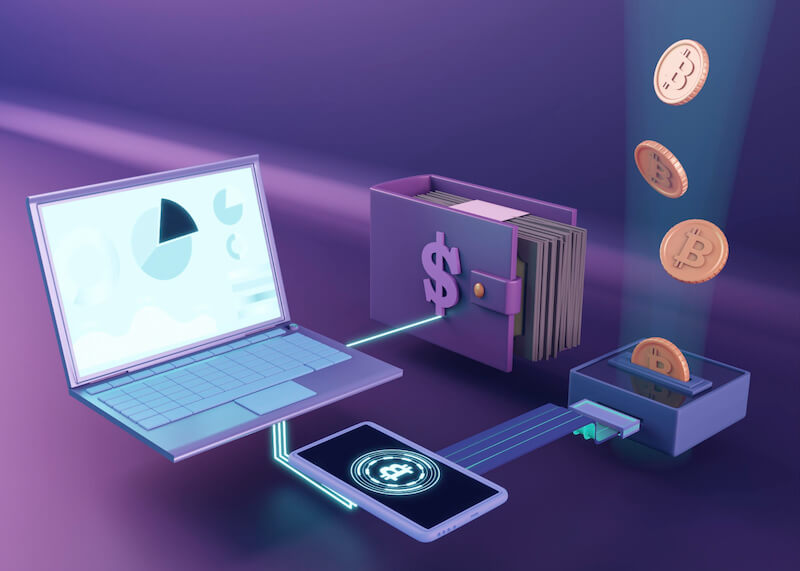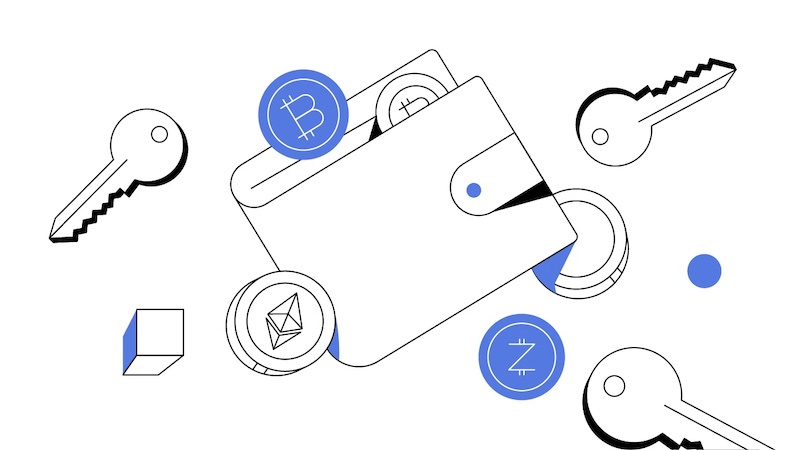Safe and secure ways to store cryptocurrency: it can be a digital jungle out there. Choices matter, and when it comes to safeguarding your digital coins, making the right one is crucial. Let’s cut to the chase. You need an unbeatable guide that puts complex tech talk into plain speech, serving up practical know-how without dull buzzwords. From hot wallets buzzing with online energy to cold wallets locked away offline, we’ll compare them all. Delve into how offline outshines online for that vault-like protection, and get to grips with the essential tech that keeps your crypto safe. This is your express ticket to understanding, managing, and fortifying your digital treasure. Ready to transform into a crypto stronghold? Let’s forge ahead.
Understanding Cryptocurrency Storage Options
Comparing Hot Wallet vs. Cold Wallet
Hot wallets are like your cash in hand. They’re easy to use. Cold wallets? They’re your safe. Cold wallets keep your crypto off the net. This makes them super safe from hackers. For daily use, hot wallets work well. But for big amounts, cold wallets are best. Hot wallets run on devices with internet. So, they face more risk. Cold wallets, on the other hand, do not need the web. This makes them harder to attack.
Hot wallets are great for quick trades. They let you access your money fast. But they can be risky. Why? Because anything online can be hacked. Cold wallets are offline, so they’re much less risky. But they’re not so good for quick trades. For safe storage, many say cold wallets are the way to go.
Assessing Offline vs. Online Crypto Storage Solutions
With offline storage, your crypto stays off the web. It’s like keeping gold locked away. It’s very secure, but not as easy to use every day. With online storage, your crypto hangs out on the net. It’s like an online bank account. You can get to it anytime. But just like with banks, there are risks. Online storage can face attacks from hackers. You don’t want your crypto funds to vanish, right? So, for big amounts or long-term keeping, offline is often smarter.
What’s an offline storage example? A hardware wallet. It’s like a USB stick but for your crypto. Only you can open it, with your own secret code. It’s a strong choice for keeping your money locked tight. Paper wallets are another offline choice. You print your secret crypto keys on paper. Then you store it somewhere safe. Online, there are wallets that live on the web or your phone. They make it easy to shop or trade with your crypto.
With both offline and online crypto storage, think about what you need. Need to use it every day? Online might be better. Want to secure it for a long time? Go offline. It’s important to balance safety and easy use. Always remember to do your homework. Look into all your options. Choose what’s right for you. And remember, keeping your crypto safe is key!
Advanced Security Measures for Cryptocurrency Safeguarding
The Role of Hardware Wallets for Digital Currency
Think of a hardware wallet like a safe for your digital cash. Just plug it into your computer, enter a pin, and you have access. It holds your private keys, the critical bits of info that let you do transactions. Unlike online options, hardware wallets store keys offline. This makes them tough to attack from the internet. Big names in the game include Ledger and Trezor.
Implementing Multi-Signature Technology and Encrypted Digital Wallets
Multi-signature tech adds an extra layer to your crypto’s security blanket. It means you need more than one key to get to your coins. Imagine you and two friends must all turn a key to open a treasure chest. It works like that. This stops one person from having all the power. Plus, if one key gets lost, you still have backups.
Encrypted digital wallets act like secret agents for your coins. They jumble up info so only you can read it. Keep your key safe, and hackers are left out in the cold. Apps like Exodus use encryption to guard your funds.
In the world of crypto, being safe is better than sorry. Use tech like hardware wallets, multi-signatures, and encryption to sleep easy. These tools help you take control and protect what’s yours.
Best Practices for Secure Private Key Management
Backup Strategies for Cryptocurrency Holders
To keep your crypto safe, back up your private key. This is like having a spare house key. Use different places to store backups. This keeps your crypto safe even if one backup gets lost. A paper wallet can be a simple but effective backup. Just write down your key and put it in a safe place.
Utilizing Biometric Authentication and Air-Gapped Devices
Biometric security, like fingerprint scans, keeps your crypto extra safe. Only you can unlock your digital wallet this way. Air-gapped devices are not hooked up to the internet. They keep your crypto away from online thieves. Use a hardware wallet for the best security.
Mitigating Risks: From Theoretical Threats to Practical Solutions
Understanding Security Risks of Mobile and USB Wallets
Mobile wallets are always with you. This makes it handy but also risky. They face threats like theft and hacking. Problems can start when you download a bad wallet app or use insecure Wi-Fi. For USB wallets, they can get malware from computers.
The best move is to check your wallet app’s source. Make sure it’s from a trusted place. For USB wallets, only plug them into safe, known computers. It’s like choosing the right friends for your wallet’s safety.
Protecting Against Phishing and Malware Threats in Crypto Storage
Phishing tricks you into giving away your secrets. It can come as fake emails or websites. These ask for your wallet details. Malware, like viruses, can steal info from your device. Always be alert! Don’t click on links or emails that seem odd. Even if they look fine, they might not be.
To keep your coins safe, use multi-step checks. This means needing more than one proof to get into your wallet. Don’t keep all your crypto in one place. Scatter it in different places like cold storage or paper wallets. This way, if one spot gets hit, you don’t lose it all.
For computers, you need good antivirus software. It’s like a watchdog for your digital stuff. Also, keep your wallet’s backup code in a safe spot. If you get a hardware wallet, think about making it multi-sign. This means more than one sign-off is needed for a big move.
Remember, your crypto safety is in your hands. Think ahead and keep your guard up. This way, your digital treasure stays safe.
In this post, we explored how to keep your digital coins safe. We looked at hot versus cold wallets, weighed online against offline storage, and delved into advanced security like hardware wallets and multi-signature tech. I also shared my insights on managing private keys with backups, biometrics, and air-gapped devices. But remember, even the most secure methods can’t shield you from all risks. So stay sharp about mobile and USB wallet vulnerabilities and dodge phishing and malware. Keep your crypto secure by staying informed and using the best tools out there. Stay safe, stay smart.
Q&A :
What are the most secure methods for storing cryptocurrency?
Storing cryptocurrency safely is a crucial aspect of managing your digital assets. The most secure methods include hardware wallets, which store your private keys offline on a physical device, and paper wallets, which are a form of cold storage where the private keys are printed on a piece of paper. Additionally, using strong, unique passwords and enabling two-factor authentication (2FA) whenever possible can significantly enhance the security of your chosen storage method.
How do hardware wallets provide security for cryptocurrency?
Hardware wallets offer top-notch security by keeping the private keys for your cryptocurrency offline, isolating them from internet-connected devices that are vulnerable to hacks. They usually come in the form of USB devices and require a physical interaction to confirm transactions, adding another layer of security against remote theft or unauthorized transfers.
Are mobile wallets a safe option for storing cryptocurrency?
Mobile wallets provide convenience for accessing and using your cryptocurrency on the go. While they are generally safe, especially if they have robust security features like encrypted keys and biometric authentication, they are still less secure than cold storage options. To increase security, it’s recommended to use mobile wallets from reputable providers and to maintain up-to-date software on your mobile device.
What precautions should I take when using a paper wallet?
When using a paper wallet, it’s vital to take certain precautions to maintain its security. First, you should generate the wallet using a secure and offline environment to prevent exposure to online threats. Then, print it with a high-quality printer and store it in a safe, dry place, away from potential physical damage. Additionally, consider the use of tamper-resistant paper and make multiple backups stored in different secure locations.
Can cloud storage services be considered for storing my private keys?
Cloud storage is generally not recommended for storing private keys due to the risk of hacking and unauthorized access issues. If you opt for cloud storage as a backup, ensure that the keys are strongly encrypted before uploading and that the cloud account itself is secured with a robust password and 2-factor authentication. Nonetheless, for maximum security, consider sticking with dedicated cryptocurrency storage solutions like hardware or paper wallets.






